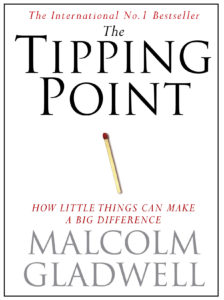 When I lead storytelling workshops, someone inevitably says their work or their business is too complex to capture in a story. That’s when I point them to Malcolm Gladwell, author of Blink, Tipping Point and other bestsellers.
When I lead storytelling workshops, someone inevitably says their work or their business is too complex to capture in a story. That’s when I point them to Malcolm Gladwell, author of Blink, Tipping Point and other bestsellers.
I once watched Gladwell keep a ballroom full of people on the edge of their seats with an hour-long story about the Civil War. Now most of us can’t tell stories on his level, but there’s an important lesson to be learned from him and his books.
He manages to explain complex sociological phenomena by bringing them down to a human scale and weaving them into enthralling stories. It’s a real art.
Read any of his books and you’ll pick up a familiar pattern. In each chapter, he starts with a small detail, a slice of life, an average character, then he shows how it illustrates a larger principle, investigates that, and finally comes back around to his starting point, offering a satisfying resolution for the reader.
Here’s a short (1:21) video from one of my presentations where I discuss what Gladwell can teach us about storytelling. (Transcript below the video.)
Transcript of the Video
I’d also recommend any of the works of Malcom Gladwell — Blink, David vs. Goliath. He and the guys who do the Freakonomics books have an amazing ability to take complex concepts and bring them down to a human scale and tell really interesting stories.
And interestingly, Malcolm Gladwell — if you hadn’t heard — has come under a lot of criticism from fellow social scientists who say, “Oh, he oversimplifies things. This is junk science. It’s misleading.”
And Gladwell’s response is, “I’m not writing for social scientists.” And indeed if he was writing for social scientists we wouldn’t be having this conversation because he wouldn’t be a New York Times bestseller.
So however you might feel about Malcolm Gladwell and that particular issue, check out his books and see how he takes something big and complex and takes it down to a human scale.
And I always think about what if more case studies could instead be called stories or success stories and could focus instead of at a 30,000-foot view — “We went into this company and we analyzed their processes and found blah-blah blah-blah blah” — but talk about, you know, “Jim is down there on the line and every day he manufactures a defective part because of this machinery that has never worked …”
Be Like Malcolm
Everyone learns differently. Some people benefit from being told how to tell stories. If you need some lessons, check out my Easy Formula for Unlocking the Power of Storytelling.
But if you’d rather be shown how to tell great stories, Gladwell is a smart place to start. (And you’ll learn some amazing things in the process!)
